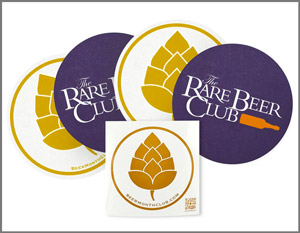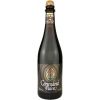Brouwerij Corsendonk (Brasserie Du Bocq) - Corsendonk Pater Dubbel
-
ABV:
7.5% -
Bottle Size:
750-ml -
Serving Temperature:
48–52° F -
Suggested Glassware:
Tulip, Goblet, or Chalice
Once again, we were excited to taste the Corsendonk beers and they didn’t disappoint. This time we chose the Pater Abbey Dubbel as our Rare Beer Club offering. As with many traditional Belgian Dubbel ales there is a sense of history to experience along with the flavors. Belgian monks have been brewing “Single,” “Dubbel,” and “Tripel” beer for ages. The Dubbels and Tripels were brewed as a means to cover their living expenses, upkeep, and maintenance of the building and grounds of their Abbeys, keeping the Single beer for themselves as sustenance. The “Single” beer, a pale colored ale, was historically the lowest in abv, think 5-ish%. The dark amber or brown colored “Dubbel” was up to about 7% abv, ours being 7.5%, and the “Tripel” beers being the highest of the three in abv came in usually around 7.5 to 9% abv. Dubbels are typically complex with pronounced malty flavors, yeasty aromas, fruity esters, and nutty essence. They are very approachable and drinkable, tending to have a dry finish that won’t fatigue the taster’s palate. Many will also display a mild bitterness and pronounced toasty expressions that will draw in a true beer aficionado. The Corsendonk Pater Abbey Dubbel has seen our shores before, but in smaller quantities year after year. The Rare Beer Club was able to obtain a significant percentage of the allocation of 750mL bottles for 2024, making it quite hard to find outside of the club.
Corsendonk Pater pours a deep amber to brown with a slight opaqueness. It has a thick pillowy off-white to tan head, made up of a creamy mousse, and exhibits great retention. It even leaves behind thin layers of lacing with every sip, decorating the inside of the glass. Though slightly opaque, the deep amber-brown hue invites your eyes to explore its depth as it is held up to the light. As we lifted the glass and held it close to our noses, we were greeted with a full spectrum of classic toasty malt aromas, baking spices, and dark fruit notes. After a few swirls in our glasses, more aromas came forth in the form of toasted bread, brown sugar, caramel, medium roast coffee, and hints of licorice. The aroma hit parade continued with dark fruit notes of plum, figs, raisins, and dates with subtler hints of dark red apples and black cherries. These aromas were capped by aromas of warm spices such as cinnamon, nutmeg, cardamom, and black pepper. The spice, fruit, and malt aromas are supported by floral yeast esters that cling to our olfactory senses.
As we sip this inviting brew all the aromas are woven together as tightly knit flavors. We first encountered warmly toasted dark caramel malt and toasted bread flavors with brown sugar and toffee close behind. The flavors continued with notes of coffee beans, plump raisins, dark plums, and chewy figs. This dense layer of fruit went on to exhibit the subtle dates, red apples, and black cherries we experienced as aromas with a crescendo of cinnamon, nutmeg, cardamom, and cocoa. This full-bodied Belgian Abbey Dubbel has a creamy, tightly knit mousse, and a long, lingering finish. With all those flavors and aromas, it is surprisingly easy to drink, and we never felt overpowered or weighed down. The 7.5% abv didn’t even register in the aromas and was almost imperceptible on the palate. As we’ve said before about these astonishing Corsendonk Abbey ales, you better get a few of these, because they go very fast…
Corsendonk Pater Abbey Dubbel seems to be built for confident aging of 3-5 years, if kept in a dark place, without high temperature fluctuations. However, further maturity and aging is not necessary to enjoy now, as the samples we had were well balanced and approachable. For food pairings we recommend meat stews, barbeque, and medium rare prime rib. French Morbier or washed rind Epoisses, Taleggio, and Munster are great cheeses to pair with as well, and for dessert try it with chocolate bread pudding and butter truffles. Yum.
Like most Belgian abbey-style beers, the roots of Corsendonk go way back. The Priory of Corsendonk was founded in 1398 by the daughter of John III, Duke of Brabant in the Flemish town of Oud-Turnhaut, and the monks of this monastery brewed beer as was customary throughout Flanders and Europe in general. The monastery, and its beer, flourished for almost 400 years until it was closed by Austrian emperor Joseph II in 1784. In the wake of the French Revolution in 1789, the monastery and all its property was seized and sold off. The monastery saw new life when its buildings were restored in 1968, evolving into a conference center, hotel, and restaurant complex over next several years.
Similarly, the priory's beer has experienced a restoration as well. A new breath of life came to Oud-Turnhaut and its brewing tradition when Sir Henricus Keersmaekers founded a new brewery there in 1906, and he kept the abbey beer tradition alive. But, when the family brewery closed in 1953 it appeared the beer would again be lost to history, and indeed it was for almost three decades until Henricus' grandson, Jef Keersmaekers, revived the brand yet again in 1982. Because the family no longer owned a brewery, Jef partnered with another family brewery, Brasserie du Bocq, to brew the Corsendonk beer.
Brasserie du Bocq was founded by Martin Belot in 1858 in the tiny town of Purnode in the Walloon province of Namur. Originally brewing was a winter hobby while his farm was not producing and his workers idle, but due in no small part to the outstanding well water found on the farm, the beer was commercially successful. There were many beers on offer from Brasserie du Bocq, such as strong beers, seasonal beers, and celebratory Christmas beers. Today, the Keersmaekers family has taken over the brewery from the sixth generation of the Belot family producing all the Brasserie du Bocq brands alongside the Corsendonk beers. A traditional Belgian brewery, all du Bocq's beers are bottle-conditioned, experiencing a secondary fermentation in the bottle to naturally carbonate the beer.

Unmatched Variety by style, brewery & country
Choose from Five different Beer Clubs offering unmatched variety by brewery,
country of origin, and beer style to suit your specific tastes.



